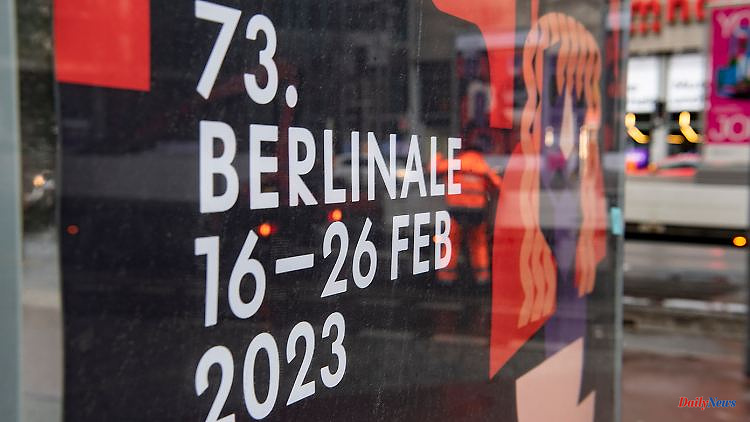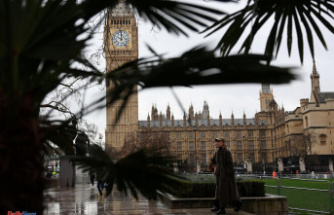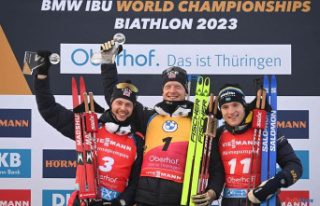Three years after the start of the corona pandemic, the Berlinale is taking place again without restrictions. However, given the international trouble spots, it will probably not be a completely carefree film festival.
The world's theaters of war and conflict overshadow and shape the program of the 73rd Berlinale. The day before the presentation of the Golden and Silver Bears on February 25 marks the first anniversary of the start of Russia's war of aggression in Ukraine. And in Iran, where protests against the mullahs' regime have been raging for months, filmmakers are still under threat -- or behind bars, like Golden Bear winner Mohammad Rasulof.
The Berlinale, which has always seen itself as a political festival, has to position itself - and it does. Solidarity with Ukraine and the demonstrators in Iran has already been invoked several times. 17 of a total of 283 films have direct links to both countries and some are red-hot. A purely Russian production was not invited.
The most eagerly awaited contribution comes from US actor and director Sean Penn: In the Berlinale Special he is presenting his documentary film "Superpower" about the Ukrainian President Volodymyr Zelenskyj, which was shot under wartime conditions.
In almost all sections there are heavy films by filmmakers who defy war, persecution and oppression. The documentary "Eastern Front" by Vitaly Mansky and Yevhen Titarenko tells about a Ukrainian first-aid squad at the front (Encounters). In "W Ukrainie" Piotr Pawlus and Tomasz Wolski use bombed streets and dinners in the underground bunker to show the reality in which Ukraine has been living since the beginning of 2022 (Forum). In "We Will Not Fade Away" by Alisa Kovalenko, five Ukrainian teenagers on the front line in the Donbas dream of seeing the world (generation 14+).
The panorama will open with the Iranian animation film "The Siren" by director Sepideh Farsi, who works in exile in Paris. "Sieben Winters in Tehran" by Steffi Niederzoll reconstructs how an Iranian student who stabbed a man who tried to rape her was sentenced to death (Perspektive Deutsches Kino). And Mehran Tamadon, who also lives in France, documents in "My Worst Enemy" how an exiled actress interrogates him in the style of an Iranian agent (Encounters).
Meanwhile, the 19 entries strong competition shines through diversity: There are dramas, melodramas, comedies, historical, documentary and animated films. Many films are family stories - such as "20,000 Species of Bees" by Estibaliz Urresola Solaguren, Philippe Garrel's "Le grand chariot" and Lila Aylé's "Totem". The production countries range from Australia to France and Spain to the People's Republic of China. Hollywood is left out - apart from the fact that US actors Jesse Eisenberg and Adrien Brody can be seen in John Trengove's thriller "Manodrome".
Instead, the German auteur film dominates with five productions, more than ever before: In "Ingeborg Bachmann - Reise in die Wüste" Margarethe von Trotta addresses the relationship between the writer and Max Frisch. Christian Petzold's "Red Sky" shows what happens to four people trapped in a holiday home during a forest fire. Christoph Hochhäusler's "Unto the End of the Night" is a thriller about an undercover agent, a big dealer and a trans woman. In Emily Atef's "Someday we'll tell each other everything", a young girl falls in love with a loner twice her age in Thuringia shortly after the fall of the Wall. Angela Schanelec's "Music" was announced as a road movie loosely based on the Oedipus myth.
Meanwhile, the highlight of the competition is that the president of the international jury is US actress Kristen Stewart - at 32, she is the youngest chairperson the panel has ever had. Multiple Oscar winner Steven Spielberg, who received the Honorary Golden Bear for his life's work, also brings Hollywood glamor to the red carpet.
When it comes to the star factor, however, the Berlinale Special trumps the competition. Cate Blanchett plays the title role in "Tár": She is the fictional conductor Lydia Tár, who is the first woman to direct a large German orchestra. Helen Mirren stars in "Golda" as Golda Meir, the first woman to serve as Israel's prime minister. Robert Schwentke cast John Malkovich in the leading role in his film about the philosopher "Seneca". There are also big names in the Panorama: In "Inside", Willem Dafoe embodies an art thief who is suddenly locked up after breaking into a collector's penthouse.
German films are also strong outside of the bear race. Lars Kraume's "The Measured Man" tells of the German colonial crimes in Namibia (Berlinale Special). Frauke Finsterwalder shot with "Sisi
Before things often get serious on the big screen, the 73rd Berlinale is off to a light start: the festival will open with the New York-based romantic comedy "She Came to Me" by US director Rebecca Miller, starring Peter Dinklage and Anne Hathaway. Both actors travel to Berlin for the premiere.
Also expected on the red carpet from February 16th to 26th are: Malkovich, Penn, Blanchett, Mirren, Dafoe, Sandra Hüller, Paula Beer and Franz Rogowski. U2 singers Bono and Boris Becker have also confirmed: A concert by the Irish band plays a role in the documentary "Kiss the Future" about the struggle of the residents of Sarajevo during the Bosnian War. And director Alex Gibney brought the life and career of the three-time Wimbledon winner to the big screen.
Meanwhile, the Berlinale is taking place again for the first time without corona measures: no masks, no tests, no distance. What remains is the challenge: "The cinema has to start again after the pandemic," said managing director Mariette Rissenbeek: Part of the audience is already back - the other has yet to be won back.












